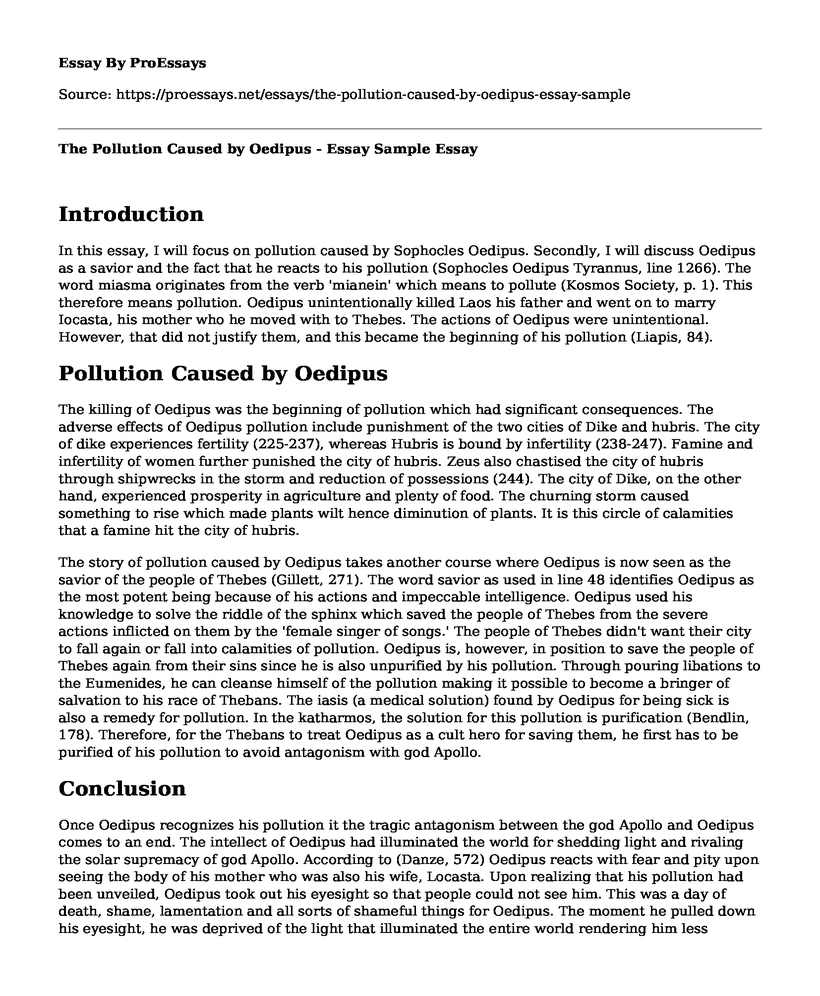Introduction
In this essay, I will focus on pollution caused by Sophocles Oedipus. Secondly, I will discuss Oedipus as a savior and the fact that he reacts to his pollution (Sophocles Oedipus Tyrannus, line 1266). The word miasma originates from the verb 'mianein' which means to pollute (Kosmos Society, p. 1). This therefore means pollution. Oedipus unintentionally killed Laos his father and went on to marry Iocasta, his mother who he moved with to Thebes. The actions of Oedipus were unintentional. However, that did not justify them, and this became the beginning of his pollution (Liapis, 84).
Pollution Caused by Oedipus
The killing of Oedipus was the beginning of pollution which had significant consequences. The adverse effects of Oedipus pollution include punishment of the two cities of Dike and hubris. The city of dike experiences fertility (225-237), whereas Hubris is bound by infertility (238-247). Famine and infertility of women further punished the city of hubris. Zeus also chastised the city of hubris through shipwrecks in the storm and reduction of possessions (244). The city of Dike, on the other hand, experienced prosperity in agriculture and plenty of food. The churning storm caused something to rise which made plants wilt hence diminution of plants. It is this circle of calamities that a famine hit the city of hubris.
The story of pollution caused by Oedipus takes another course where Oedipus is now seen as the savior of the people of Thebes (Gillett, 271). The word savior as used in line 48 identifies Oedipus as the most potent being because of his actions and impeccable intelligence. Oedipus used his knowledge to solve the riddle of the sphinx which saved the people of Thebes from the severe actions inflicted on them by the 'female singer of songs.' The people of Thebes didn't want their city to fall again or fall into calamities of pollution. Oedipus is, however, in position to save the people of Thebes again from their sins since he is also unpurified by his pollution. Through pouring libations to the Eumenides, he can cleanse himself of the pollution making it possible to become a bringer of salvation to his race of Thebans. The iasis (a medical solution) found by Oedipus for being sick is also a remedy for pollution. In the katharmos, the solution for this pollution is purification (Bendlin, 178). Therefore, for the Thebans to treat Oedipus as a cult hero for saving them, he first has to be purified of his pollution to avoid antagonism with god Apollo.
Conclusion
Once Oedipus recognizes his pollution it the tragic antagonism between the god Apollo and Oedipus comes to an end. The intellect of Oedipus had illuminated the world for shedding light and rivaling the solar supremacy of god Apollo. According to (Danze, 572) Oedipus reacts with fear and pity upon seeing the body of his mother who was also his wife, Locasta. Upon realizing that his pollution had been unveiled, Oedipus took out his eyesight so that people could not see him. This was a day of death, shame, lamentation and all sorts of shameful things for Oedipus. The moment he pulled down his eyesight, he was deprived of the light that illuminated the entire world rendering him less powerful like god Apollo (Tatti,181). The fire in the eyes of Oedipus was animated by the force of god Hermes, so when it went out, it was divine and beyond human control.
Works Cited
Bendlin, A. "Purity, and pollution." A Companion to Greek Religion (2007): 178-89.
Gillett, G, and Hankey, R. "Oedipus the king: Temperament, character, and virtue." Philosophy and Literature 29.2 (2005): 269-285.
Danze, T. M. "The Tragedy of Pity in Sophocles' Oedipus Tyrannus." American Journal of Philology 137.4 (2016): 565-599.
Liapis, V. "Oedipus Tyrannus." A Companion to Sophocles 91 (2012): 84.
Tatti-Gartziou, A. "Blindness as Punishment." Light and Darkness in Ancient Greek Myth and Religion (2010): 181.
Cite this page
The Pollution Caused by Oedipus - Essay Sample. (2022, May 03). Retrieved from https://proessays.net/essays/the-pollution-caused-by-oedipus-essay-sample
If you are the original author of this essay and no longer wish to have it published on the ProEssays website, please click below to request its removal:
- Thorwald and Nora Helmer's Attitudes Toward Money - Essay Sample
- Into Thin Air - Literary Analysis Essay
- Tartuffe Character Analysis Essay
- Poetry Analysis Essay on the Ecstasy by John Donne and the Retreat by Henry Vaughan
- Maria W. Stewart & Maya Angelou: Notable Poets, Essayists & Activists - Research Paper
- Essay Example on Howard Hughes: Success Despite OCD
- Modernism in EE Cummings' Poetry: Exploring Individualism, Experimentation and Absurdity - Essay Sample







